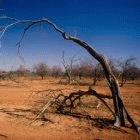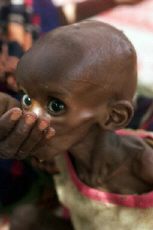
Want to help Africa? Stop driving your car. That may be unwelcome news to those who burned through a tank driving to the Live 8 gig, but the simple truth is that the fate of Africa depends as much on dealing with global warming as it does with increased aid.
The recent report “Africa: Up in Smoke?” co-authoured by Oxfam with a preface from Archbishop Desmond Tutu makes that very point, and details the many reasons with the world’s poorest continent is also the most threatened by the impacts of human induced climate change.
Fourteen countries in Africa already endure devastating water shortages. This number is expected to increase to twenty-five by 2030. Recent research shows that global warming will reduce overall rainfall in southern Africa 10% by 2050.

Small-scale farming produces most of the food in Africa. It also provides employment for 70% of the working people. Global climate change will dangerously undermine the ability of Africans to feed and support themselves by making these droughts far more likely.
“In our models, the Indian Ocean shows very clear and dramatic warming into the future, which means more and more drought for southern Africa,” said Dr. James W. Hurrell, author of a recent study by the US-based National Center for Atmospheric Research.
Dr. Richard Washington, of Oxford University is somewhat more blunt: “When the rains fail, people die.” The last major drought in southern Africa in 2002 left over 14 million people in need of direct food aid.

African coastal areas are also at risk from extreme weather and rising sea levels. We can expect more frequent disasters like Mozambique’s devastating floods of February 2000, which affected the livelihoods of 1.5 million people and cost $550 million in reconstruction and emergency relief.
It is no small irony that human induced climate change is as much of an imposition on the developing world as oppressive economic policies of the World Bank and the IMF.
The average American produces sixty five times as much carbon dioxide per capita as someone who lives in sub-Saharan Africa. In fact, between 1980 and 2001, Africa was one of very few areas of the world to experience a decline in per capita carbon dioxide emissions – not because of conservation efforts but due to increasing poverty.

Incredibly, the developed world actually provides far more aid to their domestic fossil fuel industries than to impoverished Africa. In the late 1990’s, rich countries subsidized their domestic, fossil-fuel industries to the tune of $73 billion per year.
In contrast, the recent debt relief program announced with great fanfare will amount to only about $1.5 billion per year shared between eighteen debtor countries.
The plight of Africa is ostensibly a top priority in the up coming G8 meeting. So what are the leading economies of the world pledging to collectively do to halt climate change? The short answer is absolutely nothing.
A draft communiqué leaked last week for the upcoming G8 meeting in Gleneagles Scotland speaks volumes. The US is apparently seeking to remove even such milquetoast statements as: “Our world is warming", "The problem is urgent", “The increase is due in large part to human activity", and most tellingly, "The world's developed economies have a responsibility to show leadership".
Not content with merely doing nothing about climate change, the most powerful nations on earth also appear intent on saying nothing as well. In light of the very public hand wringing about the plight of beleaguered Africans, this collective cowardice truly explores the upper stratosphere of hypocrisy.
As Archbishop Desmond Tutu said eloquently in the preface to this report, “The richest countries of the world, as represented by the G8, have a responsibility to help the poorest. This is not just charity, but a moral obligation.”
We need to hear those words and act on them. This means debt relief, increased aid and fair trade practices. Just as importantly, it means dealing with the massive and looming crisis facing the entire planet and Africa in particular resulting from our addiction to oil.
The West needs to help Africa to leapfrog “dirty development” by directing new investment to renewable sources of energy, and removing obstacles to technology transfer. These renewable energy sources also have added benefits for human health by reducing air pollution, and the need to cut local forests for fuel.

There is also an urgent need to provide directed aid to small-scale farmers that will allow them to adapt to some degree of climate change that is now inevitable.
And finally, the developed world needs to drastically reduce fossil fuel consumption. Want to help Africa? Get out of your car.
Mitchell Anderson is a freelance writer who lives in Vancouver. This piece ran nowhere.
1 comment:
Very great article, thank you
obat sakit gigi palus disita polisi
sarapan dengan eskrim membuat anak menjadi cerdas
susu bisa meredakan nyeri haid? benarkah?
manfaat minyak kelapa untuk kesehatan dan kecantikan
kulit cantik dan sehat dengan wortel
manfaat body lotion untuk tubuh
Post a Comment